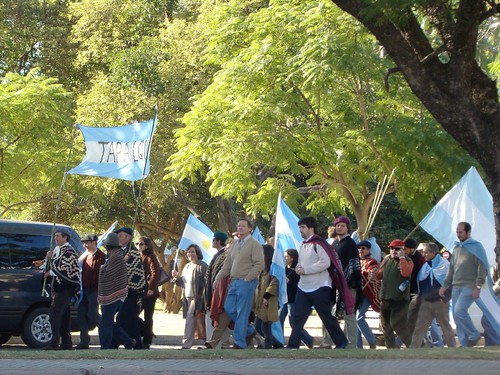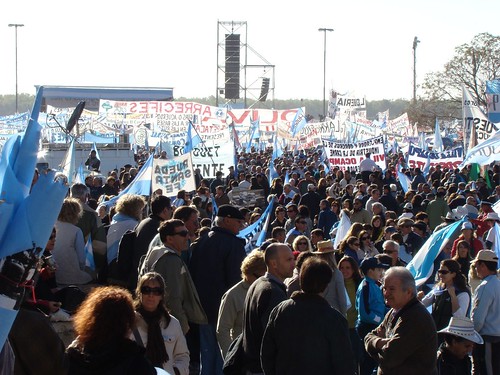I was speaking, yesterday, of the meeting called by the agricultural organizations in Rosario last Sunday, May 25, to protest the export taxes and the government's handling of agriculture and cattle farming (from now on "the meeting of the campo"). In passing I mentioned the media coverage.
It appears that hundreds of reporters and photojournalists came to Rosario, and the meeting was, of course, in the cover of every newspaper the next day. The coverage itself was varied.
La Nación, predictably, gave a lot of space to old-fashioned "common man in the street"
personal testimonies, and
romanticized the whole thing as an epic march of the dignified rural middle class. Both
La Nación and
Clarín supplied a lot of video and audio, and
gloated over the defeat of the government strategy.
Página/12, also predictably, attacked the meeting with irony, noting how some people who protest against taxes came to Rosario
flying their own airplanes or driving brand-new SUVs.
Página also did another thing, which to me was an echo of the Kirchnerist model — denial and repetition. The online edition devoted more than 50% of its content to reposting old op-ed pieces dating from the beginning of the government-vs.-campo crisis. Some were brilliant, valuable arguments for the export taxes; some were sectarian, sentimental, others cold and technical; but they were all old. Pertinent, maybe, but old. Repeated. Why republish them?
That curious fact immediately reminded me of the Kirchnerist government's insistence on certain issues to the exclusion of a reality that's biting them in the nose — the grown-up equivalent of a child closing her eyes, covering her ears and shouting "la la la I can't hear you". Kirchner (Cristina/Néstor) doesn't want to see reality. That's why Cristina had thousands of people brought to her speech in Salta, and for that audience she reveled on her husband's administration's socioeconomic achievements. This time she kept it short. She's been known to go at it for an hour. Néstor Kirchner himself never tired of congratulating himself about the economy on every single speech he gave. Repetition, noise, a mantra of figures of poverty, GDP, employment, exports, industrial production. Nonsense. Even the true parts.
Why nonsense? Argentina is doing badly on many respects. It's much, much better than six years ago, but it's not better than 15 years ago. There are problems. When the people insist that there are problems, the president can't tell them to shut up. She can't tell them to value what they've got and thank their stars they have such a good, progressive, popular government, and act offended when some dare complain about an issue. A government is not to the people what a a father is to his son — we're all adults here. The government additionally has the responsibility of keeping the high moral ground.
Of course, when a crypto-fascist movement like Peronism is in power, citizens are treated like children. Though Kirchnerism doesn't really have a cult of personality, the purposefully crafted mannerisms Cristina employs to resemble Evita Perón are rather obvious.
Now, a good father may occasionally display frustration or sadness when his children don't appreciate his efforts, but eventually he'll stop whining and do what must be done. Cristina Kirchner isn't even up to that role. She has complained about her children's lack of love for what she did for them, she has repeated
ad nauseam that she's doing her best and wants to be everyone's good mother (if only us children would obey!), she's yelled at us a little, and after that, sensing no response, she has frozen. She doesn't know what to do next. She's surrounded by powerful, violent, resentful people, and she knows she has to take them into account. They put her where she is now, after all. One of them even sleeps with her (we presume) and presides over her political party. What to do? Cristina doesn't know.


















































